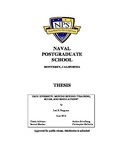USCG diversity : moving beyond "training, rules, and regulations"
| dc.contributor.advisor | Strindberg, Anders | |
| dc.contributor.author | Ferguson, Joel S. | |
| dc.date.accessioned | 2012-03-14T17:45:02Z | |
| dc.date.available | 2012-03-14T17:45:02Z | |
| dc.date.issued | 2010-06 | |
| dc.identifier.uri | https://hdl.handle.net/10945/5316 | |
| dc.description | CHDS State/Local | en_US |
| dc.description.abstract | The United States Coast Guard continues its workforce diversification initiative. Recent congressional statements communicate a lack of progress in this endeavor, and comments from senior Coast Guard leaders link workforce diversification to the ability of the USCG to fulfill its future DHS mission requirements to the best of its ability. The USCG is at a decision point. The dilemma is the feasibility of managing demography in a volunteer organization that assesses and promotes its personnel based on merit. Should the USCG maintain a merit-based admission and promotion policy, or should the goal of race/gender societal reflectiveness take precedence over the concept of merit for the USCG to "diversify" its ranks? Thankfully, the USCG does not need to choose between the concepts of merit and diversity because the two concepts are not mutually exclusive. Instead of a strict meritocracy or a highly regulated demographic personnel model, the USCG should pursue a third diversification option that clearly communicates respect for both multiculturalism (diversity) and merit-based accessions and promotions. This thesis proposes a new recruiting and promotion philosophy called The Respect Paradigm, which incorporates the organizational strengths of merit-based promotions/accessions with the USCG core value of Respect for its already existing diverse workforce. The strategy canvas presented in this thesis provides a qualitative method of marketing and messaging the Respect Paradigm to federal legislators and USCG organizational leaders. Quantitative measurements of the Respect Paradigm's success result from internal and external polling, which assess the acceptance and internalization of its philosophy and criteria. The ultimate measurement is the Respect Paradigm's effects on actual USCG diversification. | en_US |
| dc.description.uri | http://archive.org/details/uscgdiversitymov109455316 | |
| dc.format.extent | xviii, 101 p. : ill. ; | en_US |
| dc.publisher | Monterey, California. Naval Postgraduate School | en_US |
| dc.rights | Copyright is reserved by the copyright owner. | en_US |
| dc.subject.lcsh | Management | en_US |
| dc.subject.lcsh | Training | en_US |
| dc.title | USCG diversity : moving beyond "training, rules, and regulations" | en_US |
| dc.type | Thesis | en_US |
| dc.contributor.secondreader | Bellavita, Christopher | |
| dc.contributor.corporate | Naval Postgraduate School (U.S.) | |
| dc.contributor.department | Homeland Security | |
| dc.description.service | US Coast Guard (USCG) author (civilian) | en_US |
| dc.identifier.oclc | 648156760 | |
| etd.thesisdegree.name | M.A. | en_US |
| etd.thesisdegree.level | Masters | en_US |
| etd.thesisdegree.discipline | Homeland Security | en_US |
| etd.thesisdegree.grantor | Naval Postgraduate School | en_US |
| etd.verified | no | en_US |
| dc.description.distributionstatement | Approved for public release; distribution is unlimited. |
Files in this item
This item appears in the following Collection(s)
-
1. Thesis and Dissertation Collection, all items
Publicly releasable NPS Theses, Dissertations, MBA Professional Reports, Joint Applied Projects, Systems Engineering Project Reports and other NPS degree-earning written works.





